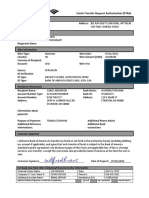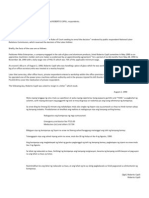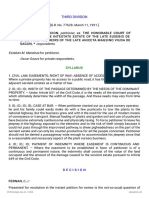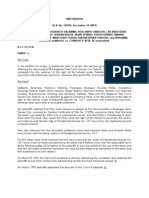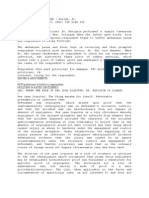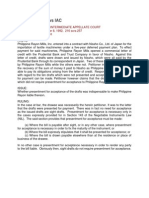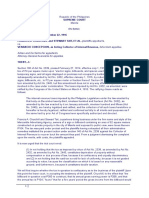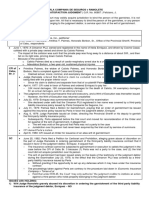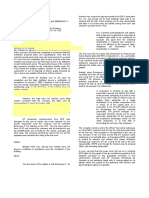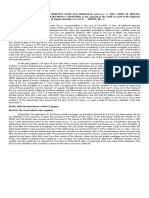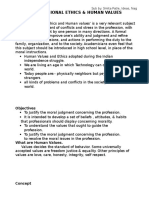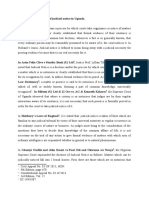G. 14 Ong V PCIB
G. 14 Ong V PCIB
Uploaded by
Chilzia RojasCopyright:
Available Formats
G. 14 Ong V PCIB
G. 14 Ong V PCIB
Uploaded by
Chilzia RojasOriginal Title
Copyright
Available Formats
Share this document
Did you find this document useful?
Is this content inappropriate?
Copyright:
Available Formats
G. 14 Ong V PCIB
G. 14 Ong V PCIB
Uploaded by
Chilzia RojasCopyright:
Available Formats
G.R. No.
160466 January 17, 2005
SPOUSES ALFREDO and SUSANA ONG, petitioners, vs. PHILIPPINE COMMERCIAL INTERNATIONAL BANK, respondent.
PUNO, J.:
FACTS: Petitioners-spouses Alfredo and Susana Ong are the President and Treasurer, respectively, of Baliwag Mahogany Corporation
(BMC). The bank alleged that BMC needed additional capital for its business and applied for various loans with it and it was grated.
Petitioners-spouses acted as sureties for these loans and issued 3 promissory notes for the purpose. Under the terms of
the notes, it was stipulated that respondent bank may consider debtor BMC in default and demand payment of the remaining balance
of the loan upon the levy, attachment or garnishment of any of its properties, or upon BMC’s insolvency, or if it is declared to be in a
state of suspension of payments. BMC filed a petition for rehabilitation and suspension of payments with the Securities
and Exchange Commission (SEC) after its properties were attached by creditors. Respondent bank considered debtor BMC
in default of its obligations. Thereafter, the bank filed a case for collection of a sum of money against petitioners-spouses to hold the
latter liable as sureties on 3 promissory notes they issued to secure some of BMC’s loans.
A Memorandum of Agreement was executed by debtor BMC, the petitioners-spouses as President and Treasurer of BMC, and
the consortium of creditor banks of BMC, including the respondent bank. The MOA took effect upon its approval by the SEC.
Thereafter, petitioners-spouses moved to dismiss the complaint. They argued that as the SEC declared the principal debtor
BMC in a state of suspension of payments and, under the MOA, the creditor banks, including respondent bank, agreed to temporarily
suspend any pending civil action against the debtor BMC, the benefits of the MOA should be extended to petitioners-spouses who
acted as BMC’s sureties in their contracts of loan with respondent bank. Petitioners-spouses averred that respondent bank is barred
from pursuing its collection case filed against them. The trial court denied the motion to dismiss. Petitioners-spouses appealed
to the CA which affirmed the trial court’s ruling that a creditor can proceed against petitioners-spouses as surety independently of its
right to proceed against the principal debtor BMC. Hence this appeal.
ISSUE: WON the creditor bank can go directly against the Spouses for the collection of payment.
RULING: The Court ruled in the affirmative.
Petitioners’ contention: that it would prejudice them if the principal debtor BMC would enjoy the suspension of payment of its debts
while petitioners, who acted only as sureties for some of BMC’s debts, would be compelled to make the payment; petitioners
add that compelling them to pay is contrary to Article 2063, Civil Code which provides that a compromise between the
creditor and principal debtor benefits the guarantor and should not prejudice the latter.
Lastly, petitioners rely onArticle 2081, Civil Code which provides that: "the guarantor may set up against the creditor all
the defenses which pertain to the principal debtor and are inherent in the debt; but not those which are purely personal to
the debtor." Petitioners aver that if the principal debtor BMC can set up the defense of suspension of payment of debts and
filing of collection suits against respondent bank, petitioners as sureties should likewise be allowed to avail of these
defenses.
Reliance of petitioners-spouses on Articles 2063 and 2081 of the Civil Code is misplaced as these provisions refer to
contracts of guaranty. They do not apply to suretyship contracts. Petitioners-spouses are not guarantors but sureties of BMC’s debts.
There is a sea of difference in the rights and liabilities of a guarantor and a surety. A guarantor insures the solvency of the debtor
while a surety is an insurer of the debt itself. A contract of guaranty gives rise to a subsidiary obligation on the part of the
guarantor. It is only after the creditor has proceeded against the properties of the principal debtor and the debt remains unsatisfied
that a guarantor can be held liable to answer for any unpaid amount. This is the principle of excussion. In a suretyship contract,
however, the benefit of excussion is not available to the surety as he is principally liable for the payment of the debt. As
the surety insures the debt itself, he obligates himself to pay the debt if the principal debtor will not pay, regardless of whether
or not the latter is financially capable to fulfill his obligation. Thus, a creditor can go directly against the surety although the principal
debtor is solvent and is able to pay or no prior demand is made on the principal debtor. A surety is directly, equally and
absolutely bound with the principal debtor for the payment of the debt and is deemed as an original promissor and
debtor from the beginning.
Under the suretyship contract entered into by petitioners-spouses with respondent bank, the former obligated themselves to
be solidarily bound with the principal debtor BMC for the payment of its debts to respondent bank. Under Article 1216, Civil Code,
respondent bank as creditor may proceed against petitioners-spouses as sureties despite the execution of the MOA which provided
for the suspension of payment and filing of collection suits against BMC. Respondent bank’s right to collect payment from the surety
exists independently of its right to proceed directly against the principal debtor. In fact, the creditor bank may go against the surety
alone without prior demand for payment on the principal debtor. The provisions of the MOA regarding the suspension of
payments by BMC and the non-filing of collection suits by the creditor banks pertain only to the property of the
principal debtor BMC. Firstly, in the rehabilitation receivership filed by BMC, only the properties of BMC were mentioned in the
petition with the SEC. Secondly, there is nothing in the MOA that involves the liabilities of the sureties whose properties are separate
and distinct from that of the debtor BMC. Lastly, it bears to stress that the MOA executed by BMC and signed by the creditor-banks
was approved by the SEC whose jurisdiction is limited only to corporations and corporate assets. It has no jurisdiction over the
properties of BMC’s officers or sureties.
The petition is dismissed.
You might also like
- LAZATIN V CAMPOSDocument2 pagesLAZATIN V CAMPOSChilzia RojasNo ratings yet
- Funds Transfer Request AuthorizationDocument1 pageFunds Transfer Request AuthorizationSaqib Rodriguez100% (1)
- Mergers & AquisitionsDocument36 pagesMergers & AquisitionsJay KishanNo ratings yet
- F 9. BPI V Concepcion & Hijos, IncDocument2 pagesF 9. BPI V Concepcion & Hijos, IncChilzia Rojas50% (2)
- Establishment of Photography and Video Studio in Barangay Macamot, Binangonan RizalDocument9 pagesEstablishment of Photography and Video Studio in Barangay Macamot, Binangonan RizalMaren MabiniNo ratings yet
- Executive Order No. - Series of 2021Document4 pagesExecutive Order No. - Series of 2021PDRRMO LagunaNo ratings yet
- Corinthian Vs TanjangcoDocument2 pagesCorinthian Vs TanjangcoJet SiangNo ratings yet
- Berot v. Siapno 1Document6 pagesBerot v. Siapno 1CZARINA ANN CASTRONo ratings yet
- Nitto V NLRCDocument4 pagesNitto V NLRCDino AbieraNo ratings yet
- Petitioner vs. vs. Respondents Esteban M Mendoza Oscar GozosDocument5 pagesPetitioner vs. vs. Respondents Esteban M Mendoza Oscar GozosFrance Sanchez100% (1)
- 8.cir vs. ST - LukesDocument2 pages8.cir vs. ST - LukesAnonymous FvcKWLNo ratings yet
- Evangelista Vs CirDocument5 pagesEvangelista Vs CirjessapuerinNo ratings yet
- Arcillas Vs Montejo 26 SCRA 197 (1968)Document3 pagesArcillas Vs Montejo 26 SCRA 197 (1968)LilianNo ratings yet
- Encarnacion v. CADocument4 pagesEncarnacion v. CAfangs88100% (1)
- Diaz Vs DeleonDocument1 pageDiaz Vs DeleonAngelica AlonzoNo ratings yet
- Natural Resources and Environmental Laws Ipra Cases: FactsDocument5 pagesNatural Resources and Environmental Laws Ipra Cases: FactsHarry Dave Ocampo PagaoaNo ratings yet
- Murder, G.R. No. 223512, 07242019 - SET ADocument3 pagesMurder, G.R. No. 223512, 07242019 - SET AhannahNo ratings yet
- 7 - Evangelista Et Al V CirDocument4 pages7 - Evangelista Et Al V CircloudNo ratings yet
- Jurisprudence - Interlocutory OrdersDocument1 pageJurisprudence - Interlocutory OrdersGesta GamoNo ratings yet
- Salaysay Vs Castro DigestDocument2 pagesSalaysay Vs Castro DigestkitakatttNo ratings yet
- Cause of Action - Complaint Vs Position PaperDocument1 pageCause of Action - Complaint Vs Position PaperDO SOLNo ratings yet
- Chiong - 050 Febtc vs. Ca GR 108164 (241 Scra 671) 23 Feb. 1995Document1 pageChiong - 050 Febtc vs. Ca GR 108164 (241 Scra 671) 23 Feb. 1995Ricarr ChiongNo ratings yet
- Facts of The Case:: Lingayen vs. CtaDocument2 pagesFacts of The Case:: Lingayen vs. CtaQhryszxianniech SaiburNo ratings yet
- Aquino Vs Pacific PlansDocument3 pagesAquino Vs Pacific PlansPhil JaramilloNo ratings yet
- Campos Rueda - Co. v. Pacific Commercial Co. 44 Phil 916 (1923)Document1 pageCampos Rueda - Co. v. Pacific Commercial Co. 44 Phil 916 (1923)FranzMordenoNo ratings yet
- Alcantara VS RetaDocument3 pagesAlcantara VS Retacatherinesulapas5673No ratings yet
- Batiquin vs. CaDocument2 pagesBatiquin vs. CaHelen Grace M. BautistaNo ratings yet
- The Court of Appeals Certified This Case To This Court Because Only Questions of Law Are RaisedDocument2 pagesThe Court of Appeals Certified This Case To This Court Because Only Questions of Law Are RaisedJas De GuzmanNo ratings yet
- Andamano Vs IacDocument2 pagesAndamano Vs IacADNo ratings yet
- Succession Assignment 2Document3 pagesSuccession Assignment 2Natsu DragneelNo ratings yet
- Commissioner of Internal Revenue Vs Court of Appeals, Et AlDocument2 pagesCommissioner of Internal Revenue Vs Court of Appeals, Et AlDon Michael ManiegoNo ratings yet
- Escritor Vs IACDocument4 pagesEscritor Vs IACGoody100% (1)
- 08 Dominion Insurance Corp V CADocument10 pages08 Dominion Insurance Corp V CAyassercarlomanNo ratings yet
- Tayag V AlcantaraDocument2 pagesTayag V AlcantaraJaz SumalinogNo ratings yet
- Equitable Vs NRLCDocument1 pageEquitable Vs NRLCKling KingNo ratings yet
- Suggested AtpDocument4 pagesSuggested AtpZoe Jen RodriguezNo ratings yet
- Prudential Bank Vs IACDocument1 pagePrudential Bank Vs IACAnita Solano BoholNo ratings yet
- Cuadra Vs MonfortDocument3 pagesCuadra Vs MonfortMJ DecolongonNo ratings yet
- Gulf Resorts V Phil Charter DigestDocument2 pagesGulf Resorts V Phil Charter Digestdivine venturaNo ratings yet
- Fahrenbach Vs Pangilinan, GR 224549, August 7, 2017 Case Digest - Javellana, LuckyDocument2 pagesFahrenbach Vs Pangilinan, GR 224549, August 7, 2017 Case Digest - Javellana, LuckyLucky JavellanaNo ratings yet
- Allied Free Workers Vs Compania MaritimaDocument4 pagesAllied Free Workers Vs Compania Maritimatin tinNo ratings yet
- Case Concerning Delimitation of The Maritime Boundary in The Gulf of Maine AreaDocument1 pageCase Concerning Delimitation of The Maritime Boundary in The Gulf of Maine AreaNiñoMaurin100% (1)
- Lung Center of The Phil vs. Quezon CityDocument1 pageLung Center of The Phil vs. Quezon CityJan Mar Gigi GallegoNo ratings yet
- Aboitiz Shipping Corp. v. General Accident Fire and Life Assurance Corp., LTDDocument2 pagesAboitiz Shipping Corp. v. General Accident Fire and Life Assurance Corp., LTDsophiaNo ratings yet
- Tiu vs. CADocument2 pagesTiu vs. CABryce KingNo ratings yet
- GSIS and Limited Portability Law CasesDocument38 pagesGSIS and Limited Portability Law CasesMarrie SantiagoNo ratings yet
- Banate Vs PCRBDocument19 pagesBanate Vs PCRBSean Asco RumaNo ratings yet
- Obillos Vs CIRDocument2 pagesObillos Vs CIRGeorge HabaconNo ratings yet
- 1 - CHR Employees v. CA - Baquilod PDFDocument2 pages1 - CHR Employees v. CA - Baquilod PDFNica Cielo B. LibunaoNo ratings yet
- Third Division: Solidbank Corporation, Petitioner, vs. Spouses Teodulfo and Carmen Arrieta, Respondents. DecisionDocument8 pagesThird Division: Solidbank Corporation, Petitioner, vs. Spouses Teodulfo and Carmen Arrieta, Respondents. DecisionChatNo ratings yet
- Patalinghug vs. CADocument4 pagesPatalinghug vs. CAjhonadheljacabanNo ratings yet
- Fort Bonifacio Development Corporation vs. Commissioner of Internal RevenueDocument28 pagesFort Bonifacio Development Corporation vs. Commissioner of Internal RevenueAriel AbisNo ratings yet
- Guevarra Vs EalaDocument18 pagesGuevarra Vs Ealaafro yowNo ratings yet
- ANTONINA LAMPANOvDocument5 pagesANTONINA LAMPANOvYour Public ProfileNo ratings yet
- Churchill and Tait vs. ConcepcionDocument5 pagesChurchill and Tait vs. ConcepcionGee GuevarraNo ratings yet
- Republic Planters Vs Court of AppealsDocument2 pagesRepublic Planters Vs Court of AppealsJayson AbabaNo ratings yet
- Spouses Fernando v. Northwest Airlines Inc.Document14 pagesSpouses Fernando v. Northwest Airlines Inc.Christian VillarNo ratings yet
- Bliss vs. DiazDocument3 pagesBliss vs. DiazGino Alejandro Sison100% (1)
- Case Digest Poli RevDocument2 pagesCase Digest Poli RevIan Luis AguilaNo ratings yet
- Delos Santos vs. FaustinoDocument9 pagesDelos Santos vs. FaustinoTrebor CuennoNo ratings yet
- Perla V RamoleteDocument2 pagesPerla V RamoleteiptrinidadNo ratings yet
- Loyola Security and Detective Agency vs. NLRCDocument2 pagesLoyola Security and Detective Agency vs. NLRCcaseskimmerNo ratings yet
- PNB Vs Manila SuretyDocument4 pagesPNB Vs Manila SuretyAerwin AbesamisNo ratings yet
- Angeles University Foundation Vs AngelesDocument3 pagesAngeles University Foundation Vs AngelesGyrsyl Jaisa GuerreroNo ratings yet
- Perlas Epg Construction vs. Court of AppealsDocument1 pagePerlas Epg Construction vs. Court of AppealsAllenNo ratings yet
- Ong Vs PCIBDocument3 pagesOng Vs PCIBGenevieve BermudoNo ratings yet
- CHUA V ABSOLUTE MANAGEMENT CORPORATIONDocument1 pageCHUA V ABSOLUTE MANAGEMENT CORPORATIONChilzia RojasNo ratings yet
- People V PanisDocument1 pagePeople V PanisChilzia RojasNo ratings yet
- VELASQUEZ V GEORGE (BATCH 5)Document1 pageVELASQUEZ V GEORGE (BATCH 5)Chilzia RojasNo ratings yet
- PEDROSA V COURT OF APPEALSDocument2 pagesPEDROSA V COURT OF APPEALSChilzia RojasNo ratings yet
- HEIRS OF GUIDO YAPTINCHAY AND ISABEL YAPTINCHAY vs. DEL ROSARIODocument1 pageHEIRS OF GUIDO YAPTINCHAY AND ISABEL YAPTINCHAY vs. DEL ROSARIOChilzia RojasNo ratings yet
- NERI V HEIRS OF HADJI YUSOP UYDocument2 pagesNERI V HEIRS OF HADJI YUSOP UYChilzia RojasNo ratings yet
- Darvin V CADocument1 pageDarvin V CAChilzia RojasNo ratings yet
- JMM Promotions V CADocument3 pagesJMM Promotions V CAChilzia RojasNo ratings yet
- ESALYN CHAVEZ V BONTO-PEREZDocument1 pageESALYN CHAVEZ V BONTO-PEREZChilzia RojasNo ratings yet
- CF Sharp Crew V CADocument2 pagesCF Sharp Crew V CAChilzia RojasNo ratings yet
- F 8. Fortaleza V LapitanDocument1 pageF 8. Fortaleza V LapitanChilzia RojasNo ratings yet
- Attention To Co-Makers: Please Read WellDocument3 pagesAttention To Co-Makers: Please Read WellChilzia RojasNo ratings yet
- N2. Atok Finance V CADocument2 pagesN2. Atok Finance V CAChilzia RojasNo ratings yet
- F 10. Gobonseng, Jr. V CADocument1 pageF 10. Gobonseng, Jr. V CAChilzia RojasNo ratings yet
- F 11. St. Dominic Corp V IACDocument1 pageF 11. St. Dominic Corp V IACChilzia RojasNo ratings yet
- F 13. PNB V Nepomuceno Productions IncDocument1 pageF 13. PNB V Nepomuceno Productions IncChilzia RojasNo ratings yet
- F 12. Sulit V CADocument2 pagesF 12. Sulit V CAChilzia RojasNo ratings yet
- Lim Tay V CADocument2 pagesLim Tay V CAChilzia RojasNo ratings yet
- Peterson, The Objects Pledged - Goods Contained in A Warehouse - Were Hardly Capable of Actual, Manual Delivery in The Sense ThatDocument1 pagePeterson, The Objects Pledged - Goods Contained in A Warehouse - Were Hardly Capable of Actual, Manual Delivery in The Sense ThatChilzia RojasNo ratings yet
- Banco Espanol V PetersonDocument1 pageBanco Espanol V PetersonChilzia RojasNo ratings yet
- Betita V GanzonDocument1 pageBetita V GanzonChilzia RojasNo ratings yet
- Joseph C. Booker, D/B/A Booker Trucking Company v. City of Atlanta, A Municipal Corporation, F. M. Couvillion, 776 F.2d 272, 11th Cir. (1986)Document3 pagesJoseph C. Booker, D/B/A Booker Trucking Company v. City of Atlanta, A Municipal Corporation, F. M. Couvillion, 776 F.2d 272, 11th Cir. (1986)Scribd Government DocsNo ratings yet
- Birsa MundaDocument10 pagesBirsa MundaSuReShNo ratings yet
- PROFESSIONAL ETHICS & Human Values Smita PatleDocument6 pagesPROFESSIONAL ETHICS & Human Values Smita Patlesmita gaydhaniNo ratings yet
- (An Autonomous Institute of Government of Gujarat) : We Provide Environmental SolutionsDocument10 pages(An Autonomous Institute of Government of Gujarat) : We Provide Environmental SolutionsKinjal VasavaNo ratings yet
- Chapter 1 Governments and Individuals PDFDocument24 pagesChapter 1 Governments and Individuals PDFKareemTarekNo ratings yet
- OTM Book 7 2014 PDFDocument321 pagesOTM Book 7 2014 PDFChristopher LajoieNo ratings yet
- WWW - Livelaw.In: in The High Court of Delhi at New DelhiDocument5 pagesWWW - Livelaw.In: in The High Court of Delhi at New DelhiSaptagiri YadavNo ratings yet
- Income Tax (Costs of Renovation and Refurbishment of Business Premise) (Amendment) Rules 2021Document5 pagesIncome Tax (Costs of Renovation and Refurbishment of Business Premise) (Amendment) Rules 2021Naqib AhmadNo ratings yet
- Chapter 14 Non-Current Assets FINAL 1Document17 pagesChapter 14 Non-Current Assets FINAL 1vumazonkebulelwa666No ratings yet
- Francisco vs. DEAC ConstructionDocument2 pagesFrancisco vs. DEAC ConstructionJOHN SOLIVENNo ratings yet
- Ley de Proteccion de Antiguedades y Obras ArtisticasDocument6 pagesLey de Proteccion de Antiguedades y Obras Artisticas15206649100% (1)
- Pmaj Honorato A BalinteDocument7 pagesPmaj Honorato A BalinteKrizzia SoguilonNo ratings yet
- Degree Form 2020Document2 pagesDegree Form 2020WUB QEC50% (4)
- Lecture 8 Metrics For Entrepreneurs and Startup Funding PDFDocument28 pagesLecture 8 Metrics For Entrepreneurs and Startup Funding PDFBhagavan BangaloreNo ratings yet
- Pakistan CompaniesDocument345 pagesPakistan CompaniesMIan MuzamilNo ratings yet
- QG SAPB1onCloud Midterm Chapter4 Lesson1Document76 pagesQG SAPB1onCloud Midterm Chapter4 Lesson1jgbunaoNo ratings yet
- Day 04 - Writing An EmailDocument17 pagesDay 04 - Writing An EmailHÒA NGUYỄN CHÍNo ratings yet
- Mold-Tek: Packaging LimitedDocument2 pagesMold-Tek: Packaging LimitedKeigan ChatterjeeNo ratings yet
- 3d LevelsDocument3 pages3d Levelsapi-350245383No ratings yet
- Cert TUVDocument2 pagesCert TUVadrianioantomaNo ratings yet
- MODULE 11 HIS003 The Bangsamoro and GPH Peace ProcessDocument8 pagesMODULE 11 HIS003 The Bangsamoro and GPH Peace ProcessHamza A. MinantaraNo ratings yet
- QUIZ 3 Accounting For Special Transactions 4Document1 pageQUIZ 3 Accounting For Special Transactions 4ninocastillo316No ratings yet
- Minutes of The Barangay SessionDocument1 pageMinutes of The Barangay SessionsbpulosanisidronuevaecijaNo ratings yet
- Doctrine of Judicial NoticeDocument3 pagesDoctrine of Judicial NoticeKeitaNo ratings yet
- Air India: Itinerary ReceiptDocument6 pagesAir India: Itinerary ReceiptamolNo ratings yet
- TCS-1 15010 TCS-2 2775 TCS-3 5265 TCS-4 100 TCS-6 3440 TCS-7A 1490 TCS-7B 830 TCS-7C 380 Toll 760Document2 pagesTCS-1 15010 TCS-2 2775 TCS-3 5265 TCS-4 100 TCS-6 3440 TCS-7A 1490 TCS-7B 830 TCS-7C 380 Toll 760basha shaikNo ratings yet

